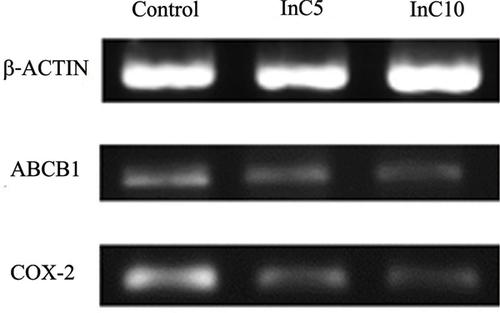当前位置:
X-MOL 学术
›
Lett. Drug Des. Discov.
›
论文详情
Our official English website, www.x-mol.net, welcomes your
feedback! (Note: you will need to create a separate account there.)
Indole Curcumin Reverses Multidrug Resistance by Reducing the Expression of ABCB1 and COX2 in Induced Multidrug Resistant Human Lung Cancer Cells
Letters in Drug Design & Discovery ( IF 1.2 ) Pub Date : 2020-08-31 , DOI: 10.2174/1570180817666200402124503 Sankar Pajaniradje 1 , Kumaravel Mohankumar 1 , Rakesh Radhakrishnan 1 , Shamim Akhtar Sufi 1 , Srividya Subramanian 1 , Parthiban Anaikutti 2 , Surya Prakash Rao Hulluru 2 , Rukkumani Rajagopalan 1
中文翻译:

吲哚姜黄素通过减少诱导的多药耐药性人肺癌细胞中ABCB1和COX2的表达来逆转多药耐药性
更新日期:2020-09-11
Letters in Drug Design & Discovery ( IF 1.2 ) Pub Date : 2020-08-31 , DOI: 10.2174/1570180817666200402124503 Sankar Pajaniradje 1 , Kumaravel Mohankumar 1 , Rakesh Radhakrishnan 1 , Shamim Akhtar Sufi 1 , Srividya Subramanian 1 , Parthiban Anaikutti 2 , Surya Prakash Rao Hulluru 2 , Rukkumani Rajagopalan 1
Affiliation

|
Background: Drug resistance by the cancer cells towards current chemotherapeutic approaches poses a great challenge. In the present study, an indole analogue of a well-known plant derived anticancer molecule, curcumin, was tested for its Multidrug Resistance (MDR) reversing potential in induced multi drug resistant A549 cell line.
Materials and Methods: Human lung cancer cell line A549 was made Multidrug Resistant (MDR) by prolonged treatment with low dosage of Docetaxel, an established anticancer drug. The MDR induction was confirmed by morphological evidence, Hoechst 33342 staining, MTT assay, Rhodamine123 staining and RT-PCR of ABCB1 gene. Protein expression studies were carried out using western blotting technique. Results and Discussions: The induced MDR A549 cells exhibited significant increase in the gene expression of ABCB1 gene at the transcriptional level. Retention and efflux studies with Pglycoprotein (P-gp) substrate Rh123 indicated that indole curcumin inhibited P-gp mediated efflux of Rhodamine. Furthermore, treatment of MDR A549 cells with indole curcumin showed downregulation of gene expression of ABCB1 and COX 2. This was also confirmed from the decreased protein expression of COX 2. Conclusion: The results of the present study indicate that indole curcumin reverses multi drug resistance by downregulating the expression of ABCB1 and COX 2 genes. Thus, indole curcumin may act as a potent modulator for ABCB1 and COX 2 mediated MDR in lung cancer.中文翻译:

吲哚姜黄素通过减少诱导的多药耐药性人肺癌细胞中ABCB1和COX2的表达来逆转多药耐药性
背景:癌细胞对当前化学治疗方法的耐药性提出了巨大挑战。在本研究中,测试了一种著名的植物来源的抗癌分子吲哚姜黄素的吲哚类似物在诱导的多药耐药A549细胞系中的多药耐药(MDR)逆转潜力。
材料和方法:通过长期使用低剂量的多西他赛(多西他赛)(已确立的抗癌药物)进行长期治疗,将人肺癌细胞A549制成耐多药(MDR)的药物。通过形态学证据,Hoechst 33342染色,MTT测定,Rhodamine123染色和ABCB1基因的RT-PCR证实了MDR的诱导。使用蛋白质印迹技术进行蛋白质表达研究。结果与讨论:诱导的MDR A549细胞在转录水平上显示ABCB1基因的基因表达显着增加。对糖蛋白(P-gp)底物Rh123的保留和外排研究表明,吲哚姜黄素抑制了罗丹明P-gp介导的外排。此外,用吲哚姜黄素处理MDR A549细胞显示出ABCB1和COX 2基因表达的下调。这也从COX 2蛋白表达的下降得到了证实。结论:本研究结果表明,吲哚姜黄素通过下调ABCB1和COX 2基因的表达来逆转多药耐药性。因此,吲哚姜黄素可以作为肺癌中ABCB1和COX 2介导的MDR的有效调节剂。






























 京公网安备 11010802027423号
京公网安备 11010802027423号